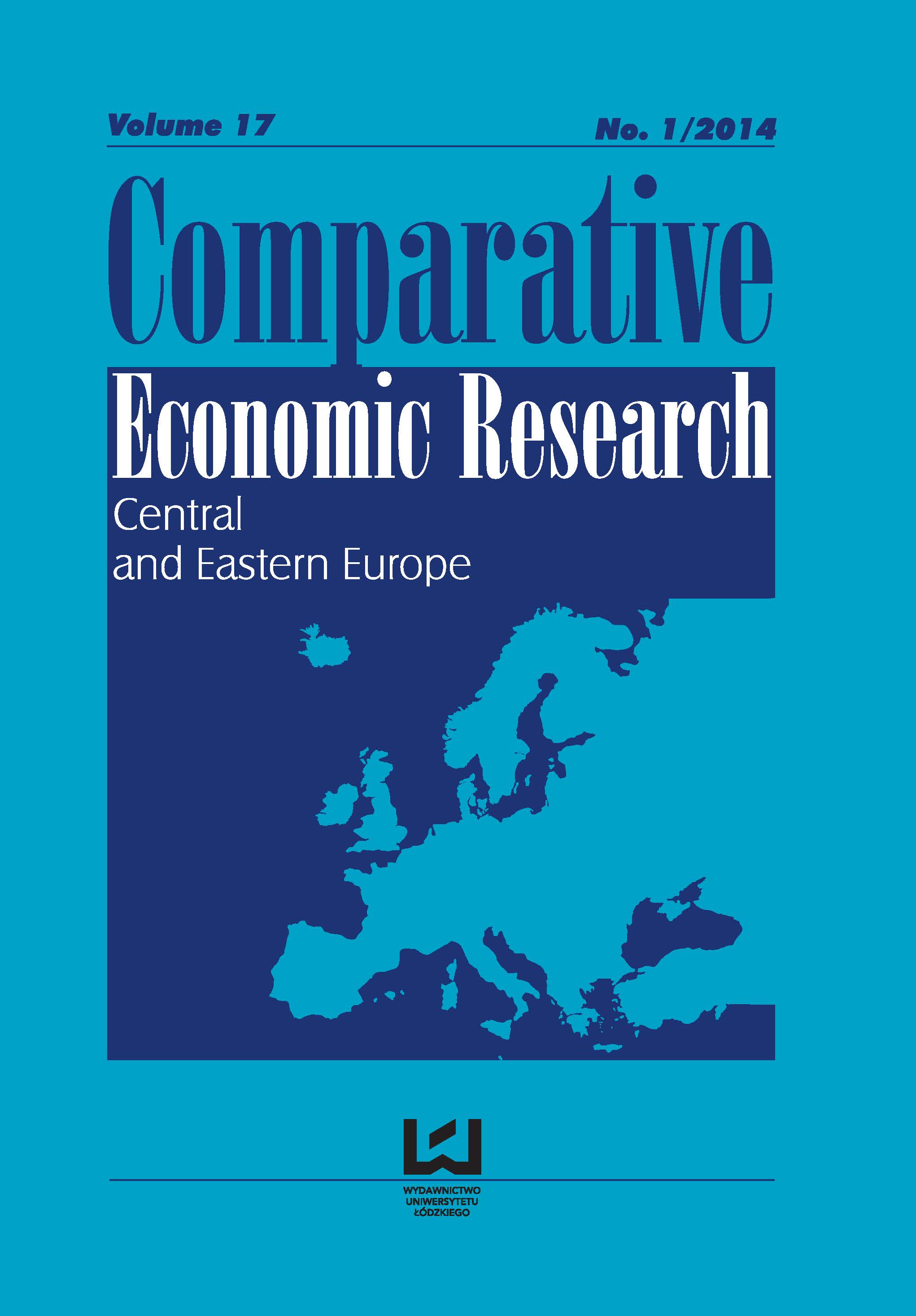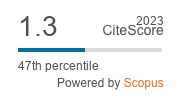Comparison of Nominal and Real Rigidities: Fiscal Policy Perspective
DOI:
https://doi.org/10.2478/cer-2014-0004Keywords:
fiscal policy, nominal rigidities, real rigiditiesAbstract
This paper examines the impact of nominal and real rigidities in the economy on the effects of fiscal policy. The study confirmed the hypothesis that both nominal and real rigidities enhance the impact of fiscal policy on the Polish economy. In the case of nominal price rigidity it was found that the impact of government spending on GDP depends on the conduct of monetary policy. On the other hand, under conditions of wage rigidity, the strength of fiscal multipliers depends on the slope of the labour supply curve. The study also examined two types of real rigidities - lack of access to the credit market, and consumer habits. Analyses show that the above rigidities result primarily in a strong positive relationship between government spending and the level of consumption.
Downloads
References
Abel A.B. (1990), Asset Prices under Habit Formation and Catching Up with the Joneses, ʻThe American Economic Review Papers and Proceedingsʼ, vol. 80
Google Scholar
Akerlof G.A, J.L. Yellen (1985), A Near-Rational Model of the Business Cycle, with Wage and Price Inertia, ʻQuarterly Journal of Economicsʼ, vol. 100
Google Scholar
Baranowski P. (2008), Reguła Taylora i jej rozszerzenia, ʻGospodarka Narodowaʼ, no. 7–8
Google Scholar
Baranowski P., (2011), Reguła polityki pieniężnej dla polski – porównanie wyników różnych specyfikacji, ʻOeconomia Copernicanaʼ, no. 3
Google Scholar
Bewley T.F., (1999), Why Wages Don’t Fall during a Recession?, Harvard University Press, Cambridge, Mass.
Google Scholar
Bils M., P.J. Klenow (2004), Some Evidence on the Importance of Sticky Prices, ʻJournal of Political Economyʼ, vol. 112 (5)
Google Scholar
Calvo G., (1983), Staggered Prices in a Utility-Maximizing Framework, ʻJournal of Monetary Economicsʼ, no. 12
Google Scholar
Cardia E., (1995), The effects of fiscal policies in a general equilibrium model with nominal wage contracts, ʻEconomic Lettersʼ, no. 49
Google Scholar
Chari V.V., P.J. Kehoe, E.R. McGrattan (2000), Sticky Price Models of the Business Cycle: Can the Contract Multiplier Solve the Persistence Problem?, ʻEconometricaʼ, vol. 68, no. 5
Google Scholar
Chintagunta P., E. Kyriazidou, J. Perktold (2001), Panel Data Analysis of Household Brand Choices, ʻJournal of Econometricsʼ, vol. 103
Google Scholar
Dhyne E., L.J. Àlvarez, H. le Bihan, G. Veronese, D. Dias, J. Homann, N. Jonker, P. Lunnemann, F. Rumler, J. Vilmunen (2006), Price Changes in the Euro Area and the United States: Some Facts from Individual Consumer Price Data, ʻJournal of Economic Perspectivesʼ, vol. 20, no. 2
Google Scholar
Dickens W.T., L. Goette, E.L. Groshen, S. Holden, J. Messina, M.E. Schweitzer, J. Turunen, M.E. Ward (2006), How Wages Change: Micro Evidence from the International Wage Flexibility Project, European Central Bank Working Paper, no. 697
Google Scholar
Dixit A., J.E. Stiglitz (1977), Monopolistic Competition and Optimum Product Diversity, ʻAmerican Economic Reviewʼ, vol. 67
Google Scholar
Galí J., J.D. López-Salido, J. Vallés (2007), Understanding the Effects of Government Spending on Consumption, ʻJournal of the European Economic Associationʼ, vol. 5(1)
Google Scholar
Golosov M., R.E. Lucas (2003), Menu Costs and Phillips Curves, NBER Working Paper, 10187
Google Scholar
Góra M., O. Rohozynsky, I. Sinitsina, M. Walewski (2008), Social Security Driven Tax Wedge and its Effects on Employment and Shadow Employment, ESCIRRU Working Paper, no. 08
Google Scholar
Hansen G.D., (1985), Indivisible Labor and the Business Cycle, ʻJournal of Monetary Economicsʼ, vol. 16 (3)
Google Scholar
Johnson D.S., J. Parker, N. Souleles (2004), Household Expenditure and the Income Tax Rebates of 2001, NBER Working Paper 10784, September
Google Scholar
Kashyap A.K. (1995), Sticky Prices: New Evidence from Retail Catalogues, ʻQuarterly Journal of Economicsʼ, vol. 110
Google Scholar
Krajewski P. (2011), Podażowe efekty polityki fiskalnej w świetle modelu realnego cyklu koniunkturalnego i wnioski dla gospodarki polskiej, ʻEkonomistaʼ, no. 4
Google Scholar
Krajewski P. (2012), Tax Rates Impact on GDP in Poland, ʻEquilibriumʼ, no. 3
Google Scholar
Krajewski P. (2013), Oddziaływanie wydatków rządowych na rynek pracy, ʻWiadomości Statystyczneʼ, no. 1
Google Scholar
Krajewski P., M. Mackiewicz (2006), Długookresowy wpływ polityki fiskalnej na kształtowanie się zatrudnienia – analiza panelowa, ʻGospodarka w Praktyce i Teoriiʼ, no. 2
Google Scholar
Kuchta Z., K. Piłat (2010), Zastosowanie modelu realnego cyklu koniunkturalnego Hansena dla gospodarki Polski, ʻGospodarka Narodowaʼ, no. 11–12
Google Scholar
Kydland F.E, E.C. Prescott (1977), Rules Rather Than Discretion: The Inconsistency of Optimal Plans, ʻJournal of Political Economyʼ, vol. 85
Google Scholar
Linnemann L., A. Schabert (2003), Fiscal Policy In the New Neoclassical Synthesis, ʻJournal of Money, Credit and Bankingʼ, vol. 35
Google Scholar
Mankiw N.G. (1985), Small Menu Costs and Large Business Cycles: A Macroeconomic Model of Monopoly, ʻQuarterly Journal of Economicsʼ, May
Google Scholar
Mankiw N.G., D. Romer (eds.) (1991), New Keynesian Economics, MIT Press, Cambridge Mass
Google Scholar
Phelps E.S., Taylor J.B. (1977), Stabilizing Powers of Monetary Policy under Rational Expectations, ʻJournal of Political Economyʼ, February
Google Scholar
Ravn M., S. Schmitt-Grohe, M. Uribe (2006), Deep Habits, ʻReview of Economic Studiesʼ, vol. 73
Google Scholar
Taylor J.B. (1980), Aggregate Dynamics and Staggered Contracts, ʻJournal of Political Economyʼ, February
Google Scholar
Taylor J.B. (1993), Discretion versus Policy Rules in Practice, ʻCarnegie-Rochester Conference Series on Public Policyʼ, vol. 39
Google Scholar
Taylor J. B. (1999), Staggered Price and Wage Setting in Macroeconomics, [in:] J.B. Taylor, M. Woodford (ed.), Handbook of Macroeconomics, Elsevier, New York
Google Scholar
Downloads
Published
How to Cite
Issue
Section
License

This work is licensed under a Creative Commons Attribution-NonCommercial-NoDerivatives 4.0 International License.











